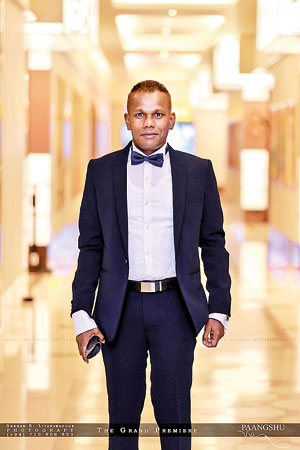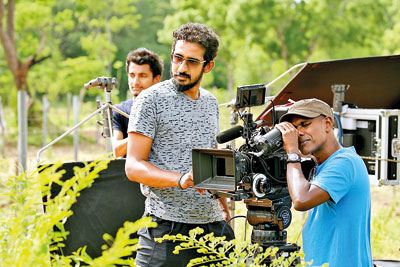More time to don the creative cap

At the premiere of Paangshu
On this week’s ‘Notes of Resilience’, law lecturer, creative practitioner and activist Visakesa Chandrasekaram discusses the release of his movie ‘Paangshu’ after the first lockdown, the importance of friends and family bonds in cultivating personal resilience and reconnecting with an old artistic practice.
How did the pandemic affect the work you do? In what ways did you have to adjust?
A significant part of my work is academic. The second portion is my creative work and then the third is activism which also has an element of social liaising. If I were to speak about my bread and butter, we were initially very disillusioned and confused because our university system did not have this online method of teaching as a practice, particularly in our humanities areas.
It was a long waiting game. After close to two months we began preparing for online work so we ended up actually completing a full academic year online. And then we came to the point that we have to conduct exams. We have been exploring lot of creative solutions, particularly when it comes to local languages as students don’t have good typing speed and can’t rely on electronic word processing.
Sometimes I feel like we became closer, in one way, with the students – particularly when you are working with students that you have already had face-to-face contact. But then on the other hand, when you are meeting an entirely new batch of students online and when you can’t see them, you don’t know to whom you’re speaking, you don’t know their body language or if they have understood complex concepts and things like that, it is challenging in one way.
In terms of my artistic life, I do something every couple of years. And so it happened to be the year that I had the release of a film. Unlike a lot of other filmmakers, I just punched into the risk of releasing it soon after the reopening of the cinemas. I can remember when I presented the film for the media, I said, you know this is not only about the launching of a movie but this is also about regaining our cultural lives. So it was significant from that point of view, though it was a risk. Although it didn’t end up making financial gains, the movie created the discourse we wanted and got huge attention and media exposure through critiques and reviews because there was a need for content.
And apart from that, I was able to actually fix one screenplay and prepare the first draft of another screenplay. With less community contact and time alone, if you’re a writer, it was the ideal opportunity to write.
And the third thing was with my activism — before this whole thing happened, at least twice, three times a month, I would engage in political party work, LGBT rights or some kind of activism work. And all of these have sort of gone because they are no longer possible and people wouldn’t take the risk to come, even they are permitted on some occasions.
And I think, out of all these things, this is what I really worry about. As members of a democracy and also citizens who want to protect democracy, this exercising of our freedom of expression is diminishing. And my worry is whether this will be gone permanently. One example is during the 1988/89 insurgency, a lot of things like midnight buses and 9.30 film screenings were stopped and they never came back, except for a couple of places in Colombo. So those are my worries as an activist, I guess.
2020 has been a challenging, slow-burn year for many. How have you been cultivating personal resilience?
A long time ago, I used to study Bharatha natyam. I started in high school and continued in university and then started again 13 years ago but then I had an injury. Even when I was putting up a show I said this is going to be my last dance. I was under the impression that after an age, your body can’t cope with it – Bharatha natyam is particularly heavy and is one of the most difficult dance styles if you do it properly.
During the first week or two of the lockdown in Colombo, I started to feel like this was going to take a toll on my mental health and I decided to dance a bit. And now I still continue. Bharatha natyam is a very mental and physical exercise and has a sort of meditation and spirituality behind it. I was very surprised that at 50 I still have the energy to dance heavy steps and I haven’t forgotten everything.
I thought I might take meditation up but I didn’t – I was doing a lot of writing and this agitated my mind-set, in a good way.
I take long telephone calls with friends locally and overseas. You became closer to your close friends and you became distant from your distance friends. The fact that you have apps like WhatsApp is fantastic because in those days, you had to buy a call card to speak to overseas friends and the calls were eaten up in a couple of minutes. Like some other people, I tried balcony gardens and things like that which didn’t work at all.
I think I was in a good position as an academic, just to keep moving on with life and work and get paid. I work as much as I do when the universities are physically open because we have so much to do. And yeah, I think that’s how I’m still in one piece.
n In the backdrop of the pandemic, what are the key learnings you are taking away from the year?
It probably has nothing to do with the pandemic but I learned through releasing a film about how much the arts have space and currency than individual or collective activism. I don’t think it answers your question but it is a lesson that I learned in this particular time.
I also realized that I have to be more self-sustainable – to live with things that are under our control and also living with minimum things. And friendships – how important it is to become closer to your friends and family and have close contact with them. And work – to have a piece of work that you keep aside to pick up when things like this happen so you won’t be lost, without having anything to do.

Behind the camera: Visakesa on location
How are you gearing up for 2021?
I am very positive. I think it isn’t the end of the world and we are going to pick up.
Everybody thought when there is no international travel, the whole world economy is going to collapse but it is still going on. So I think there will be a vaccine and we’re going to resume our lives hopefully by the end or middle of next year (…) I think one of the first items in my list is going for a holiday back to my second country (Australia) because I lived there for 17 years and I miss my friends.
And I think I want to do more creative work. Particularly, for a filmmaker like me what is most important is that you have a really good screenplay ready when the time comes, so you can make it. So next year, apart from my academic work and building and engaging with my students, I think that is one of the biggest agenda items that I have – that I have to create and start building that foundation for the next work. The other thing is not to expect too much from life – but that is probably a lesson rather than an agenda. I have all those dreams and hopes but if things are not going to work out, you have to accept it as it is.


